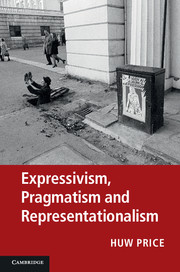Book contents
2 - Two expressivist programmes, two bifurcations
Published online by Cambridge University Press: 05 July 2013
Summary
The previous lecture focused on naturalism. In that context, my discussion of representation was a means to an end. I argued that it is the role of representationalist presuppositions in much contemporary naturalistic metaphysics that best reveals both the theoretical priority of what I called subject naturalism and the vulnerability of object naturalism. In this lecture, representation itself takes centre stage, though I shall approach it, in part, from the wings: via two views in contemporary philosophy that set themselves up in opposition to mainstream representationalists, at least about certain matters. These two views are the self-avowedly ‘expressivist’ positions of Simon Blackburn, on the one hand, and Robert Brandom, on the other.
Perhaps surprisingly, the issue of the relationship between these two expressivist programmes has been little discussed. In my view, they complement each other rather well, though there are some apparent points of tension to be negotiated. One tension turns on the fact that Blackburn, like other writers in what I shall call the ‘Humean’ expressivist tradition, takes for granted a ‘bifurcation’ between descriptive and non-descriptive uses of declarative utterances. (Blackburn's own version of this view is distinctive in that he lays great stress on the need to explain why some non-descriptive uses of language are nevertheless ‘quasi-descriptive’, in taking declarative form in the first place.) Brandom, on the other hand, appears to offer us a uniform account of the role of assertoric language, with no place for such a distinction.
- Type
- Chapter
- Information
- Expressivism, Pragmatism and Representationalism , pp. 22 - 44Publisher: Cambridge University PressPrint publication year: 2013
- 1
- Cited by



